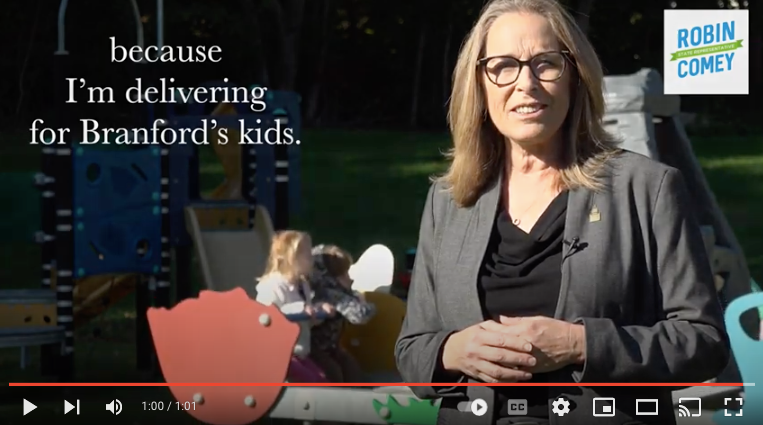"I got involved locally to advocate for my kids and now, as State Representative, I have the honor of working with Branford parents to fight for all of our kids."
EARLY
CHILDHOOD

"I firmly believe that investments in early childhood pays dividends to local governments across time, and across systems and reduces the need for later interventions in education, health care, and law enforcement." ~ Robin Comey
Working parents have long struggled to find affordable, quality childcare in our state and across our country. It was an issue pre-pandemic and has been made worse with the public health crisis. Pandemic related closures, staff shortages and price increases are all inextricably linked to parents, especially mothers, that are coping with the realities of trying to re-enter the workforce or get ahead in their careers.
The facts are:
Throughout Covid Connecticut has done some really innovative work to stabilize an upended industry and we were recognized in Washington DC as being leaders throughout the country by getting money to the frontline quickly.
We did this by:
For years, I've been advocating for expanding eligibility in the Care4Kids program for parents who want to go to school to further their education or are participating in job training programs. This year with the passing of Public Act 21-171, hundreds of families will now be able to access affordable childcare in these instances. There is still a lot of work to do and I am focused on Connecticut's next challenges.
I recognize the important role the Birth-to-Three programs that provide intervention services for children ages 0-3. They give parents the skills to be able to help their children who are experiencing developmental delays. I am working with my colleagues to increase rates for these providers and the nearly 10,000 children and families. These early interventions are preventative in nature and cost effective as special education costs only increase as kids hit school age, contributing to higher school budgets and higher local taxes. If we don't attend to the needs of these children and the programs who care for them during the most significant stage of development, Connecticut's children will never realize their full potential.
I work everyday on policies that expand quality, affordable child care in this state. We must address the true cost of quality care in order to give early educators living wages and to make their businesses sustainable. We have a system where the quality of a program is widely dependent on the centers resources and funding streams to attract and maintain workers. We must set in motion an increase in salaries over 5-7 years and provide livable wages for these workers, in an industry where the median state income is $26,000. Prioritizing investments that attract teachers, provide them with more training, apprenticeships, and work to learn programs will be critical to the long-term success of the childcare industry.
Working parents have long struggled to find affordable, quality childcare in our state and across our country. It was an issue pre-pandemic and has been made worse with the public health crisis. Pandemic related closures, staff shortages and price increases are all inextricably linked to parents, especially mothers, that are coping with the realities of trying to re-enter the workforce or get ahead in their careers.
The facts are:
- 1.3 million mothers dropped out of the workforce when covid depleted child care choices
- States are losing hundreds of millions of dollars in economic activity due to child care breakdowns
Throughout Covid Connecticut has done some really innovative work to stabilize an upended industry and we were recognized in Washington DC as being leaders throughout the country by getting money to the frontline quickly.
We did this by:
- Expanding support for Family Care Programs by investing in training and programs that give these small business owners the tools they need
- Partnering with The Women's Business Development Council, who are providing financial relief and capital to licensed child care providers
- Awarding 47 grants to area childcare programs in the past year to provide important stabilization of the industry
- Promising additional investments to programs throughout 2022
For years, I've been advocating for expanding eligibility in the Care4Kids program for parents who want to go to school to further their education or are participating in job training programs. This year with the passing of Public Act 21-171, hundreds of families will now be able to access affordable childcare in these instances. There is still a lot of work to do and I am focused on Connecticut's next challenges.
I recognize the important role the Birth-to-Three programs that provide intervention services for children ages 0-3. They give parents the skills to be able to help their children who are experiencing developmental delays. I am working with my colleagues to increase rates for these providers and the nearly 10,000 children and families. These early interventions are preventative in nature and cost effective as special education costs only increase as kids hit school age, contributing to higher school budgets and higher local taxes. If we don't attend to the needs of these children and the programs who care for them during the most significant stage of development, Connecticut's children will never realize their full potential.
I work everyday on policies that expand quality, affordable child care in this state. We must address the true cost of quality care in order to give early educators living wages and to make their businesses sustainable. We have a system where the quality of a program is widely dependent on the centers resources and funding streams to attract and maintain workers. We must set in motion an increase in salaries over 5-7 years and provide livable wages for these workers, in an industry where the median state income is $26,000. Prioritizing investments that attract teachers, provide them with more training, apprenticeships, and work to learn programs will be critical to the long-term success of the childcare industry.
BEYOND THE EARLY
YEARS
Having children changed my perspective on education. Historically, I was not what you would call an enthusiastic learner. But this changed when my daughter was young and I experienced learning through a child's eyes.
Today, as your State Representative, I serve on the Education Committee. I am focused on my role as a policy maker representing my constituents, as parents, children and community members. The question for me is always, "Is the child's best interest being served?" The answer should be yes.
We can all agree that the past two years have been incredibly difficult on everyone. Teachers, nurses, social workers and the administration have been doing some really heavy lifting, standing up virtual learning platforms quickly and then getting our children back to school for in-person learning. As lawmakers we have been focused on policies that support our students and the school community across the state.
Today, as your State Representative, I serve on the Education Committee. I am focused on my role as a policy maker representing my constituents, as parents, children and community members. The question for me is always, "Is the child's best interest being served?" The answer should be yes.
We can all agree that the past two years have been incredibly difficult on everyone. Teachers, nurses, social workers and the administration have been doing some really heavy lifting, standing up virtual learning platforms quickly and then getting our children back to school for in-person learning. As lawmakers we have been focused on policies that support our students and the school community across the state.
- Providing an avenue for the CSDE to develop resources and guidance as to what type of virtual learning environments best serve our students and our teachers.
- We are prioritizing the integration of social-emotional learning into various aspects of professional development and in-service training for many employees, including school resource officers. This also includes administering social-emotional learning assessments to our students to develop better impulse control, self-discipline, emotion management and to be a more successful problem solver,
- We are continuing our work within our existing state school bullying statutes and making legislative recommendations for model school climate policy, with a statewide virtual school plan while taking into consideration students and teachers.
- Connecticut ended lunch shaming for publicly identifying children with unpaid meal charges.
- Connecticut created a separate and much need Office of Dyslexia and Reading Disabilities.
- Connecticut created a Center for Literacy Research and Reading Success.

